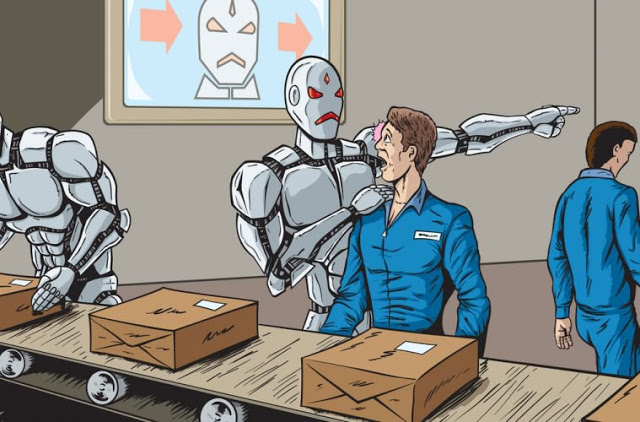(Katherine) RPA, or robotic process automation, is becoming an increasingly disruptive force within the global economy. A complete transformation of labour — a Fourth Industrial Revolution — is already upon us, driven by advances in the areas of artificial intelligence. AI has already begun to impact both the philosophy and practice of business, and as it accelerates to include a wider range of applications, will become increasingly intertwined in all areas of life.
Related: No Transhumanism Needed! | 10 Ordinary Humans With Extraordinary Superpowers, Plus 7 more
by Katherine, September 5th, 2017
For millennial workers today, the workplace is changing beneath our feet. Technology jobs may offer flexible perks and benefits, and technology itself clears a path for efficiencies untold — but is there anything lost in the ongoing quest to further quantify, automate, and outsource natural human intelligence? A thorough examination of its ethical implications is imperative as both its power and reach becomes more total.
The Evolution of Automation
The evolution of technology triggers an avalanche of societal and economic consequences. And the greater marriage of human intelligence to machine intelligence has, throughout history, meant many unforeseen changes. Incorporating more advanced AIs into our world means many new questions, as these bots are (at least in some sense) working as functional participants in society. How should they be programmed to make choices that reflect an ethical awareness and responsibility?
AIs, fundamentally, are computer programs capable of autonomous decision-making. Within the last 300 years, automation technology has disrupted the lives of all human workers. When work first moved from the farm to the factory in the 19th century, labour met a new reality — the meaning of a “job” was redefined as people left behind an agricultural life for public work in mills and factories powered by machinery. Automated manufacturing gained further momentum during World War II in the manufacture of military supplies. In the 1950s and 60s, following the war, the United States experienced a second period of industrial upheaval. Many companies introduced newly sophisticated computers to the workforce, automating processes and functions to gain competitive advantage.
Gaining Momentum
The 1960s were defined by a willingness and a capacity to challenge the status quo — in 1964, IBM introduced the first mass-produced computer operating system, setting to motion today’s fast-paced era of digital innovation. Today, the combined force of digital technology and automation continues to redefine the nature of “work” and what the future of jobs will look like.
Erik Brynjolfsson, a professor at the MIT Sloan School of Management, and his collaborator Andrew McAfee, imagine that “Digital technologies — with hardware, software, and networks at their core — will in the near future diagnose diseases more accurately than doctors can, apply enormous data sets to transform retailing, and accomplish many tasks once considered uniquely human.” To come out ahead in the oncoming “race against the machines” depends on “recognizing the problem and taking steps such as investing more in the training and education of workers.”
Evolving With Automation
Millennials are the largest generation working today. Employees in this demographic — digital natives — do have a much easier time adapting to new technology and digital workflows compared to older generations. Many millennial workers don’t want to find ways to conform to old, outdated business practices. When faced with a sluggish traditional job market, swathes of the millennial labour force have moved online to participate in the growing “gig” economy. New platforms, like UpWork, TaskRabbit, and Textbroker, allow economic activities to be accomplished by on-demand freelancers rather than full-time employees.
The future, they say, belongs to the fast. And according to futurist Dr. James Canton, “It is largely a matter of coevolution. With automation driving down value in some activities and increasing the value of others, we redesign our work processes so that people are focused on the areas where they can deliver the most value by partnering with machines to become more productive.”
Many workers in the “millennial” generation realize that in order to compete with computers, they must complete “natural intelligence” tasks with ever-greater speed and efficiency. This means handing out certain jobs to automation software, or even intelligent digital assistants. While there may be less paid work available for IT specialists, accountants, or even customer relations associates in the future, “social” skills and roles requiring collaboration with both humans and machines are in increasingly greater demand.
However fast it will happen, there’s no doubt that a great shift is on the horizon. Working alongside “intelligent” bots and navigating the new digital economy will demand fearlessness in the face of digital automation. Remember we are only human, but in the future, that may be our greatest advantage.
About the Author
Katherine, hails from the dark side of the moon. Always needs extra condiments. Is the one in the relationship who is good at naming stuffed animals.
_________________________
Stillness in the Storm Editor’s note: Did you find a spelling error or grammar mistake? Do you think this article needs a correction or update? Or do you just have some feedback? Send us an email at [email protected] with the error, headline and url. Thank you for reading.

Leave a Reply